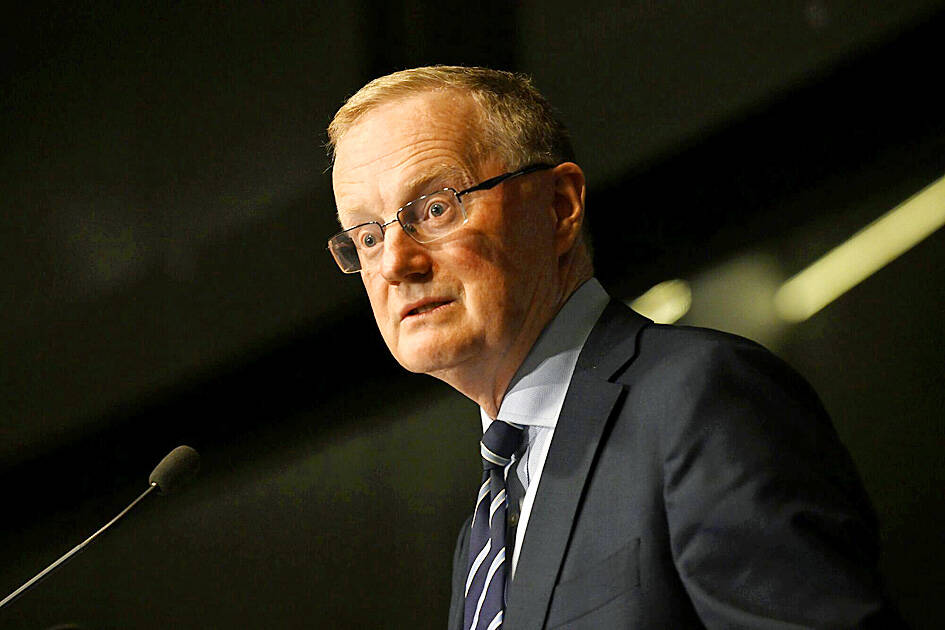Australia’s central bank yesterday hiked interest rates to an 11-year high and warned that further increases might be on the horizon to get surging prices under control.
The Reserve Bank of Australia lifted the key rate 25 basis points to 4.1 percent, its highest level since May 2012, with Governor Philip Lowe saying inflation had “passed its peak.” but was still stubbornly high.
Most analysts surveyed by Bloomberg had forecast that officials would stand pat, while the announcement saw the Ausralian dollar jump more than 1 percent against the US dollar.

Photo: Bloomberg
However, stocks sank about 1 percent in Sydney.
“This further increase in interest rates is to provide greater confidence that inflation will return to target within a reasonable time frame,” Lowe said in a statement.
“High inflation makes life difficult for people and damages the functioning of the economy,” he added.
Government figures released last week showed prices surged 6.8 percent in April, up from 6.3 percent in March, outstripping previous forecasts that suggested a drop.
“Recent data indicate that the upside risks to the inflation outlook have increased and the board has responded to this,” Lowe said.
The latest rate hike heaps further pressure on mortgage holders who are, on average, already forking out hundreds of Australian dollars more each month to meet their repayments.
Lowe said that many Australian households were feeling a “painful squeeze on their finances.”
“Some further tightening of monetary policy may be required to ensure that inflation returns to target in a reasonable time frame, but that will depend upon how the economy and inflation evolve,” he said.
The decision comes after the independent Fair Work Commission lifted the national minimum wage by 5.75 percent starting July 1.

The US dollar was trading at NT$29.7 at 10am today on the Taipei Foreign Exchange, as the New Taiwan dollar gained NT$1.364 from the previous close last week. The NT dollar continued to rise today, after surging 3.07 percent on Friday. After opening at NT$30.91, the NT dollar gained more than NT$1 in just 15 minutes, briefly passing the NT$30 mark. Before the US Department of the Treasury's semi-annual currency report came out, expectations that the NT dollar would keep rising were already building. The NT dollar on Friday closed at NT$31.064, up by NT$0.953 — a 3.07 percent single-day gain. Today,

‘SHORT TERM’: The local currency would likely remain strong in the near term, driven by anticipated US trade pressure, capital inflows and expectations of a US Fed rate cut The US dollar is expected to fall below NT$30 in the near term, as traders anticipate increased pressure from Washington for Taiwan to allow the New Taiwan dollar to appreciate, Cathay United Bank (國泰世華銀行) chief economist Lin Chi-chao (林啟超) said. Following a sharp drop in the greenback against the NT dollar on Friday, Lin told the Central News Agency that the local currency is likely to remain strong in the short term, driven in part by market psychology surrounding anticipated US policy pressure. On Friday, the US dollar fell NT$0.953, or 3.07 percent, closing at NT$31.064 — its lowest level since Jan.

The New Taiwan dollar and Taiwanese stocks surged on signs that trade tensions between the world’s top two economies might start easing and as US tech earnings boosted the outlook of the nation’s semiconductor exports. The NT dollar strengthened as much as 3.8 percent versus the US dollar to 30.815, the biggest intraday gain since January 2011, closing at NT$31.064. The benchmark TAIEX jumped 2.73 percent to outperform the region’s equity gauges. Outlook for global trade improved after China said it is assessing possible trade talks with the US, providing a boost for the nation’s currency and shares. As the NT dollar

The Financial Supervisory Commission (FSC) yesterday met with some of the nation’s largest insurance companies as a skyrocketing New Taiwan dollar piles pressure on their hundreds of billions of dollars in US bond investments. The commission has asked some life insurance firms, among the biggest Asian holders of US debt, to discuss how the rapidly strengthening NT dollar has impacted their operations, people familiar with the matter said. The meeting took place as the NT dollar jumped as much as 5 percent yesterday, its biggest intraday gain in more than three decades. The local currency surged as exporters rushed to